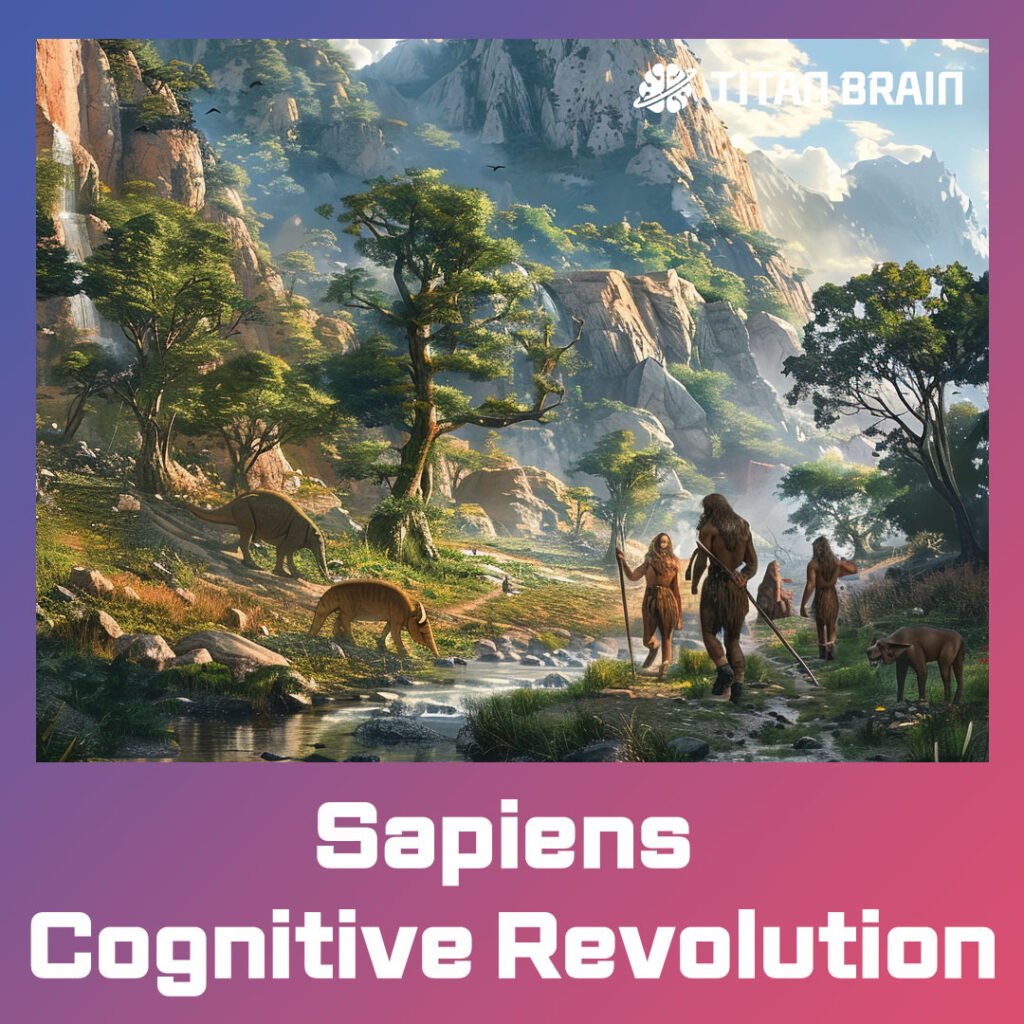Let’s explore the Sapiens Cognitive Revolution and how language impacts our thinking. The Sapiens Cognitive Revolution refers to the period when Homo sapiens began to dominate the world through the use of language. However, the issue is that the Sapiens Cognitive Revolution has created our current cultures, myths, and religions, which now dominate our thoughts. We will look into what aspects of our freedom are being unknowingly taken away.
1. The Powerful Weapon of the Stone Age: Language
In modern society, the use of language seems natural, but this was not the case in prehistoric times. Humans were able to dominate the Earth because they could use language.
1) Origin of Language
The exact origins of language in human history remain undiscovered. There are various hypotheses about how language first appeared.
These include theories that language developed naturally, evolved within social and cultural contexts, appeared as the brain developed, or emerged as humans started using tools.
While it’s unclear how language originated, its impact on us is more significant. Below, we will explore Dr. Harari’s hypothesis.
2) Why Homo Sapiens Survived
Historian Yuval Noah Harari suggests in his book “Sapiens” that six different human species might have coexisted.
These species include Homo sapiens, Homo neanderthalensis, Homo erectus, Homo rudolfensis, Homo habilis, and Denisovans.
According to Dr. Harari, Homo sapiens survived and led to modern humans because they could use language. He argues that the effective use of language allowed Sapiens’ ancestors to communicate about predators and hunting opportunities, which was crucial for survival and organizing groups.
3) Sapiens Cognitive Revolution
The Sapiens Cognitive Revolution encompasses the various processes that occurred as Homo sapiens began using language.
With language, humans could transmit information, establish behavioral norms, and pass down knowledge from one person to another, from parents to children, and to subsequent generations.
The accumulation and transmission of knowledge greatly empowered humans, but the most significant ability of language was to create entirely new worlds in the human mind. These worlds, which exist in the form of understanding within our minds but not in the physical world, became the basis for culture, myths, and religions.
These elements were essential as humanity formed alliances, built tribes, and cooperated within and beyond growing groups, though they also led to numerous wars.

2. Impact of the Sapiens Cognitive Revolution on Us
Many surveys indicate that most people are employed, and a majority of these individuals find their jobs uninteresting. Typically, they engage in uninspiring work, leading to a lack of passion in their professional lives.
1) Rules of ‘Must Do’
Being born human comes with various societal rules. We are expected to go to school, make friends, present ourselves well to others, attend college, secure a job, and get married.
While life inevitably involves these stages, everyone faces crucial moments when they can choose to live life on their own terms.
It is crucial not to blindly follow these rules as given; they are remnants of the Sapiens Cognitive Revolution.
2) Invisibility of Language
Studies have been conducted to understand how language influences our perception of the world.
Jules Davidoff conducted research with the Himba tribe of Namibia, who have numerous words for green but none for blue.
In a study, the Himba were shown a circle of squares, all green except for one blue. When asked to identify the odd one out, they either could not distinguish the blue or took a long time to identify it. However, when a slightly different shade of green was used instead of blue, they quickly recognized the different square.
This research shows that humans more readily recognize things that are defined by language, shaping our perception.

3. Cultural Influence Emerging from the Sapiens Cognitive Revolution
The guidelines for living, developed and transmitted through language, evolved into the rules that govern our culture.
This culture has allowed us to understand the world better, process events quickly, create religions and states, educate our children effectively, and enhance our physical and mental capacities to match our large brains.
However, this cultural influence has also led to implicit rules about how life ‘should’ be, judging those who do not conform.
1) Escaping Cultural Background
The cultural background mentioned here can be seen as the set of rules about the world that emerged from the Sapiens Cognitive Revolution. These are not absolute truths but relative ones.
2) Relativity of Cultural Background
While the physical world operates on absolute truths—rocks are hard, water is wet, fire is hot—the mental world is governed by ideas, concepts, myths, customs, and rules developed by our ancestors and handed down through generations.
These are not absolute truths but are relative, often only relevant to specific cultures or tribes and not necessarily to all humanity.
3) Imperfections of Cultural Background
The cultural background that started with the Sapiens Cognitive Revolution was initially meant to guide humans effectively. However, it now restricts and confines us instead of freeing us.
The world of absolute truth is based on facts, whereas the world of cultural background is based on opinions and agreements. Although cultural backgrounds exist only in our minds, they are vividly real.
4) Steve Jobs’ View on Rules
Steve Jobs once said that the rules of the world are made by people no smarter than you.
When we realize that these rules are not absolute, we learn to think outside the box and live beyond the limits imposed by cultural backgrounds.

4. Conclusion and Q&A
We have explored what the Sapiens Cognitive Revolution is and how it has evolved into our current cultural context. Below, we will address frequently asked questions about the Sapiens Cognitive Revolution.
1) What is the Sapiens Cognitive Revolution?
It refers to the new ways of thinking and communicating that emerged with Homo sapiens’ use of language between 70,000 and 30,000 years ago.
2) What impact did the Sapiens Cognitive Revolution have on humanity?
The development of language led to advances in knowledge and technology. This process formed the mental world—culture, religion, beliefs, thoughts, rules—that has unwittingly shaped the rules of our lives.
3) Did the Sapiens Cognitive Revolution have a positive impact on humanity?
Without the Cognitive Revolution, humanity would not have thrived and developed as it has. It allowed humans to think and act efficiently and effectively.
However, the cultural background that emerged from the Cognitive Revolution now limits our thoughts and actions. To live the lives we desire, we must break free from this cultural background.
For those curious about social contagion or how one’s beliefs in a cultural context might negatively impact them psychologically, please refer to the link below for more information.
► Source and Reference Information:
– Vishen Lakhiani – “The Code of the Extraordinary Mind: 10 Unconventional Laws to Redefine Your Life and Succeed on Your Own Terms”
– Vishen Lakhiani’s personal website
– Be the Titan Brain


